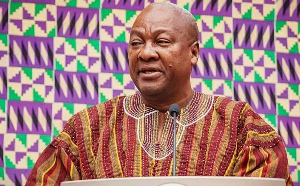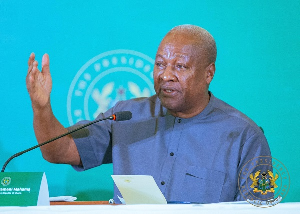A Comparative Study of the United Kingdom’s Experiment of the Office of Attorney-General and the Ghana’s Debate on Why the Office of Attorney-General and Minister of Justice must be Decoupled
BRIEFS & MEMOS [PART I]
“The Attorney-General is indeed where law and politics meet. The role, combining as it does the roles of Chief Legal Adviser to the Government, Minister, and guardian of the public interest, is a undoubtedly a constitutional oddity. The Consultation document recognised that the focus of the debate on the role of the Attorney was the tension between the various functions of the A-General, being a Minister and being an independent guardian of the public interest and performing superintendence functions, for example on decisions relating to sensitive prosecutions; and the tension between being a party politician and a member of Government, and the giving of independent and impartial legal advice. For all the problems, which I acknowledge, no suggestion that an A-General in modern times has in fact taken a decision on the basis of political or otherwise improper considerations has been substantiated. The consultation exercise did not provide any evidence to support this sort of allegation...the test for any proposal for change should be whether it enhances the effective administration of justice, the maintenance of the rule of law and the protection of the public interest,” said Baroness Scotland [1].
INTRODUCTION
At heat of the 2012 presidential election petition: we overheard President John Dramani Mahama re-echoing the need to decouple the office of the attorney-general, from the ministry of justice. The background to this advocacy had been the quest for a fairer delivery of justice. This is not new. Not long ago, the British were confronted with a similar agitation and the questions that were posed at the time and might certainly be of interest to the Ghanaian are as follows: should the role of the Chief Legal Adviser to the Government be separated from that of a political Government Minister? And if so, who should exercise the role? What would be the possibilities for reform if the A- General were to remain the Government's chief legal adviser? Should the A-General’s role in relation to criminal proceedings be changed? And what changes would be necessary to the A-G’s public interest functions? It is unlikely that things are going to work for the better just on the basis of a mere administrative rebranding-it must be the money-first obsession of the Ghanaian, which ought to be addressed.
COMMENTARY
In today’s Ghana, allegations of State crimes such as bribery and corruption and political cover-ups have increasingly become the focus of media and public attention. Politicians, victims’ organisations, civil liberties and police lobby groups are indeed, all worriedly vocal in commenting on the day-to-day operations of the criminal justice system and here, in relation to “extreme” ideological patronage and its pitfalls that seem to hamper the country’s desperate quest to sustain good governance. Yet the office of the A-General, as provided for under Article 88(1) of the 1992 Constitution, has had among others, the sole burden of making ultimate prosecutorial decisions which as it appears, had had its challenges.
Before we deal with the brief historical account of the office of Attorney-General in the UK, we mention in passing the role of the UK A-G as guardian of the public interest, covers such matters as protector of charity; a power to take part in or instruct the Queen's proctor to intervene in certain family law [marriage] proceedings; takes decisions under the Freedom of Information Act in relation to papers of a previous administration; may bring or intervene in legal proceedings in the public interest. Similar to Ghana, the A-G has also the power to bring contempt proceedings to protect criminal trials and the administration of justice. So, why had Ghana’s test case, been so miserable and disappointing?
Brief History: The Attorney-General
Laurence del Brok, is cited as the first King’s Attorney in the UK. History has it that it was in around 1247- over many centuries past, that he was appointed to sue “the King's affairs of his pleas before him”. But the first person to be called “Attorney General” according to Baroness Scotland’s accounts was John Herbert who was appointed as the King’s principal law officer in 1461. Sir John Jervis, who was Attorney in the middle of the nineteenth century, is said to have complained that only a person who had held the office could have had any conception of the labours of an Attorney-General. “Nobody who has not experienced it” he said “can have a notion of the wear upon the constitution.” The seventeenth century Francis Bacon, described the role of Solicitor General as “one of the painfulness places in the Kingdom” and the posts of Solicitor and Attorney as “the extreme painful places wherein we serve” [2].
This might well be understood if we were to consider, more recently, the case of Martin Amidu- one of the Ghana’s immediate-past Attorney-Generals and Minister of Justice, who allegedly, side-stepped political and ideological patronage in the Case of the Republic v. Alfred Agbesi Woyome, and was consequently, fired without notice. Research shows that some Law Officers have had more reason than others to complain. The most extreme; perhaps, being the case of John Cooke- the first Solicitor General of the English Commonwealth, who in 1649, led for the prosecution in the trial of King Charles I, only to be rewarded with execution for high treason after the Restoration. Legal history has it that Attorney-General John Cooke was the only Law Officer to be hanged, drawn and quartered.
In the UK, the Attorney General is the Chief legal adviser to: Her Majesty the Queen, Parliament and the Government. The Attorney-General is the Supervisor and Superintendent of the Prosecutorial Authorities (Serious Fraud Office (SFO), Crown Prosecution Office (CPS), and The Revenue and Customs Prosecution Office (RCPO) The A-General is also the Leader of the Bar and had non-statutory oversight of the prosecutors in government departments, the Treasury Solicitors Department and armed services prosecuting authority. The Attorney-General is the Guardian of the Rule of Law and Public Interest. This is fast true, of the constitutional role of the A-G and Minister for Justice in our Republic.
Baroness Scotland- the first woman to be appointed on 28 June 2007 to hold the office as an A- General by Prime Minister Gordon Brown since its foundation in 1315, in the UK, writes that “what really struck me when I took on the role of an Attorney-General was its breadth and complexity. I had had no idea of the range and number of the Attorney's functions; and I was surprised by that as by the time of my appointment I had been a barrister for thirty years, a QC for sixteen, and a Minister for eight. If my knowledge as an insider was so limited, what hope was there for those more distant from the role?” “I had only been in the post of Attorney General a few weeks when the Prime Minister launched the “Governance of Britain” Green Paper setting out a series of proposals for constitutional reform. Among those proposals was a commitment to reform the role of the A-G...I have enjoyed the extraordinary, I have also had the task of reviewing and reforming the role and ensuring it is fit for our times.”
Rule of Law and Public Interest
President John Dramani Mahama and Progressive People’s Party’s leader Dr Paa Kwesi Nduom, are crying for reforms. We share with them the following concerns as championed by Brown-led Labour Party. The main focus of the UK’s review exercise was as follows: (1), a comprehensive public debate with the widest range of interested parties; (2), had no preferred option for reform; and (3), the overriding objective to enhance public confidence and trust in the office of Attorney General. In that debate Baroness Scotland suggested that: “the test for any proposal for change should be whether it enhances the effective administration of justice, the maintenance of the rule of law and the protection of the public interest”. In an answer to the fundamental reform questions raised, a draft Bill which was subjected to strict scrutiny by the Joint Committee on the Constitutional Reform Bill and by the House of Commons Justice Committee which, like its predecessor, always showed a keen interest in the role the A-General was loud in its calls for fundamental change was published.
The Outcome of the Review
After two years, one Green Paper, one White Paper, and two Parliamentary Committee Reports, the Gordon Brown-led Labour Government communicated its decision in July 2009, deciding that the office of Attorney General, is fundamentally sound and that while some significant reforms were needed these did not require any change in the law. “The Attorney General has to give his days to law and his nights to politics which leave, in days of late parliamentary sittings, but little out of the twenty-four hours for the man himself,” Baroness Scotland quoted a nineteenth century commentator in a rare expression of sympathy for the lot of the A-General. What alternative model has been proposed that would be as good as the one we have, she asked. “I have seen no proposal for change that really satisfies those tests.”
The Attorney-General and The Rule of Law
One of the key areas that captured the attention of the reformist was the role of the attorney-general and the rule of law. According to LexisNexis [3], the Rule of Law, in its most basic form, is the principle that no one is above the law. “The rule follows logically from the idea that truth, and therefore law, is based upon fundamental principles which can be discovered, but which cannot be created through an act of will. The most important application of the rule of law is the principle that governmental authority is legitimately exercised only in accordance with written, publicly disclosed laws adopted and enforced in accordance with established procedural steps that are referred to as due process. The principle is intended to be a safeguard against arbitrary governance, whether by a totalitarian leader or by mob rule.”
Thus, the rule of law is hostile both to dictatorship and to anarchy and that known laws, should not be respecter of persons just by virtue of their socio-economic or political standing. This means that before the law, we are equal and that the rules of the court and indeed the laws and policies, should be applied evenly. Attorney-General Scotland has this remark to make on this subject. “When I took office as Attorney General I swore an oath that I will “duly and truly minister The Queen's [The Republic’s] matters and sue The Queen's process after the course of the Law and after my cunning … I will duly in convenient time speed such matters as any person shall have to do in the law against the Queen as I may lawfully do, without long delay, tracting or tarrying the Party of his lawful process in that that to me belongeth. And I will be attendant to The Queen's matters when I shall be called thereto.”
Although Dame Scotland did not doubt the language of the current oath which she states may be obscure, she was nevertheless clear that she was swearing to act in accordance with the law and to uphold the rule of law. She accordingly, borrowed the words from the former Attorney General, Lord Mayhew of Twysden who once said "The Attorney General has a duty to ensure that the Queen's [The Republic’s] ministers who act in her [its] name, or purport to act in her [its] name, do act lawfully because it is his duty to help to secure the rule of law, the principle requirement of which is that the Government itself acts lawfully...Or as I like to put it, the Attorney General is asked to do is to keep the Government and its actions within the circle of justice.” In Ghana as it had always been; public servants, including private judicial officers can yes, unjustifiably, delay a service but just for their selfish pursuits.
There are millions of cases which by a stroke of pen, justice could have been done but for the sake milking the innocent litigants, that had been reported instances of dragging the hearings with relentless adjournments and missing case file/dockets and nobody being punished for that. I think separating the ministry of justice from the attorney-general alone cannot resolve some of these problems let alone discourage the public servants who run as errands at their working corridors charging much more higher service chargers for their pockets than what actually ought to have been the norm for the Government. Thus, the prevailing exploitations, injustices and deliberate service delays at our public institutions all because many feel they are not being adequately paid and therefore, have turn their workplaces as gold/diamond mining dredges but without seemingly, honest administrative controls are worrying. Few public employees seem to have the guts to remain on their desk for more than 10-15 minutes.
Thus, the quest for expeditious and timely justice delivery as well as incorruptible Ghana ought not to begin with the decoupling of the office of the attorney-general from the ministry of justice alone but also justice must be seen to be done at all levels of our national engagements. This makes justice and the rule of law real. For it is said that the rule of law can only have any real or practical, meaning where all the organs of the state, and in particular the executive, are mindful of their obligation to respect it, and do respect it. The guarding role of the 21st century attorney-general is “not just discharged as legal adviser but also wields an important role in relation to legislation, checking for legal and constitutional propriety, supporting the work of the Parliamentary Counsel and making itself available to them to raise concerns about the legality or propriety of the legislation that they are being asked to draft.”
In the UK the office of the Attorney General “polices the boundaries of the circle of justice through the Government lawyers and must get involved with difficult or high profile cases, or arbitrate between Government Departments when they disagree on a point of law. And in the first instance it is government lawyers who achieve that by telling their clients what they need to know rather than what they want to hear; and government lawyers are able to do that because they know that they are supported by a Government Minister who is doing the same thing and wants, demands, that they do the same thing.” Our A-Gs must be measured against the A-Gs of U.K’s within the circle of justice delivery.
Similar to Ghana, in UK, the A-General’s role vis-a-vis criminal matters is about upholding the rule of law. As a senior lawyer and Government Minister, the A-General superintends the main prosecuting authorities: the Crown Prosecution Service, the Serious Fraud Office and the Revenue and Customs Prosecutions Office. “Now no one seriously suggests that the Government should have no role at all in relation to prosecutions - prosecution policy is a fundamental responsibility of the Government, and we have to ensure that prosecution decisions are made properly and fairly by a service which has the capability and calibre to undertake these critical functions on behalf of the public, and we have to account to Parliament and the public for the effective provision of this vital public service.” Dame Scotland puzzled further: “So within Government, which Minister is best placed to discharge the role? Should it be, as some have suggested, a Minister in the Ministry of Justice, which already has responsibility for the courts, sentencing policy, prisons and probation?”
Indeed the A-Generals in the UK are said to have had the leverage of offering robust and independent legal advice to colleagues in Government and the exercise within Government an independence and legal probity, which further enhance the protection of the independence of prosecution decisions, not forgetting close collaboration with Cabinet colleagues to ensure that prosecution policy and the provision of an effective prosecution service retains a high priority within Government, the celebrated matters of A-General Martin Amidu and Woyome as well as Tsikata and Attorney-General Akufo-Addo, might support the quest for judicial introspection. In the UK, Save parliamentary accountability in relation to the statutory functions and independence of Directors of Public Prosecutions, the A-General does not meddle in the conduct of the vast majority of individual cases around the country, and prosecution decisions are taken entirely by the prosecutors save in exceptional circumstances.
Scotland said: “When I do that I act independently of Government applying well established prosecution principles of evidential sufficiency and public interests. I might also very exceptionally exercise the power to give a direction in an individual case where necessary to safeguard national security. Successive Attorney Generals have proceeded on the basis that the superintendence relationship entails a power of direction in individual cases, though no recent Attorney has in fact sought to give a direction in relation to an individual case. Under changes reflected in the Protocol, I will no longer have the power to give a direction in an individual case...because Ministers are in the end responsible for protecting the nation...but if I do that I will be required under the Protocol to report to Parliament so far as compatible with national security.” When then; could the Ghanaian A-G, dismiss alleged electoral material fraud?
CONCLUSION
In this paper, Dame Scotland highlighted her role as A-General and the exceptional situations where her consent was required to bring a prosecution. In our next article, we shall look at the role of A-General in the 21st century in other Commonwealth jurisdiction and what ought to be expected by the Ghanaian.
…….. References Available on Request
JusticeGhana
Opinions of Tuesday, 5 November 2013
Columnist: Fordjour, Asante














